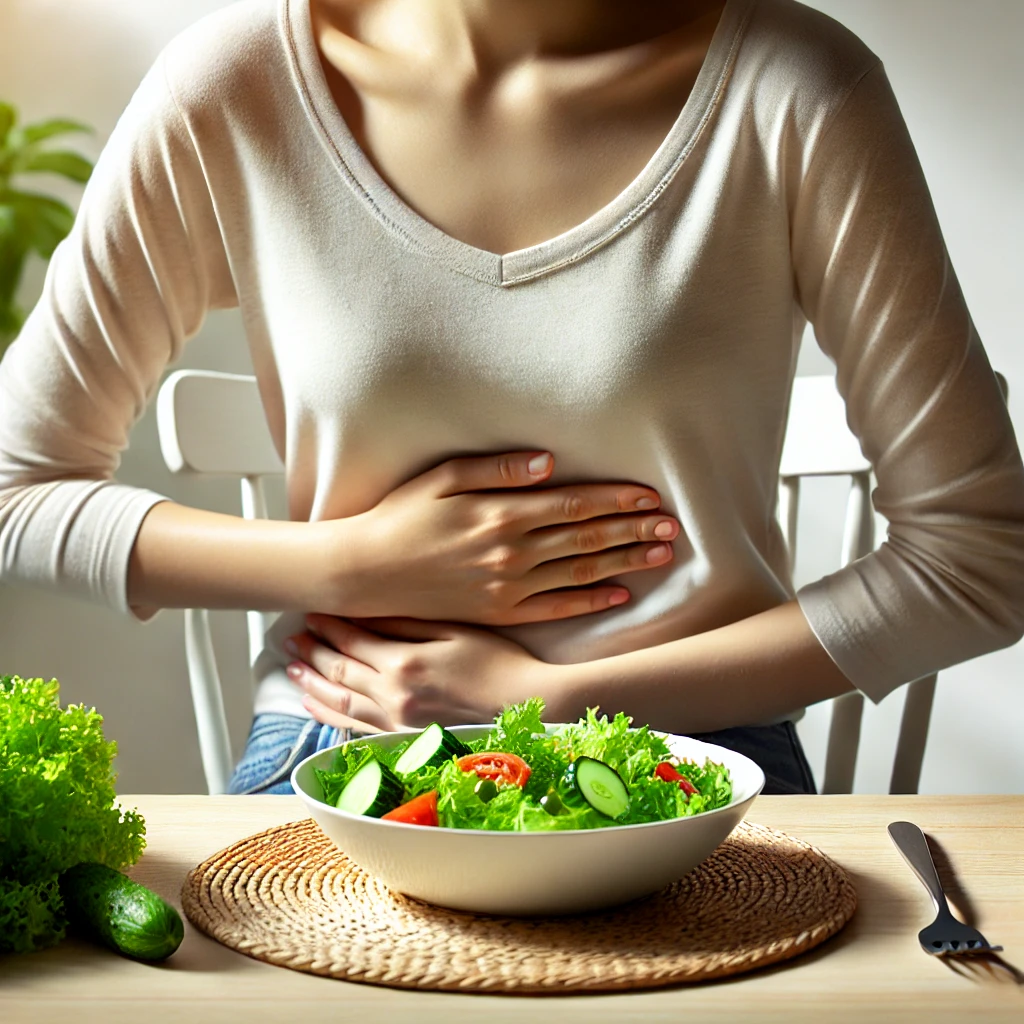Nutrition | Last Modified:
Why Does My Stomach Hurt After Eating Salad?

Eating a fresh salad often feels like a healthy choice, but for some people, it leads to discomfort. Stomach pain after eating salad, or more severe symptoms like cramps or bloating, can occur for several reasons related to your gut health, digestive processes, and food sensitivities. In this article, we explore possible causes of stomach pain after eating salad and offer insights based on gut health research, emphasizing the importance of balancing the microbiota.
Fiber and Digestive Discomfort
One of the most common reasons for stomach pain after a salad is the fiber content in raw vegetables. Fiber, particularly from raw vegetables like lettuce, cucumbers, and carrots, is a key component in promoting gut health. However, for people unaccustomed to consuming high amounts of fiber, sudden increases can lead to digestive discomfort. The body relies on gut bacteria to break down fiber, a process that produces short-chain fatty acids (SCFAs) and gas as by-products. While SCFAs are beneficial, gas can cause bloating and cramps, especially when introduced suddenly into the diet.
The fermentation of undigested fiber in the colon is another potential culprit. For people with gut sensitivity or imbalance, this fermentation process might trigger severe stomach pain after salad consumption. Introducing fiber-rich foods like salads gradually can help your gut bacteria adapt, reducing the likelihood of pain.
Microbiota Imbalance
Your gut microbiota—the trillions of microorganisms living in your digestive tract—play a vital role in breaking down food. When your gut microbiota is out of balance, consuming certain foods, especially raw vegetables, can exacerbate stomach pain. Modern diets low in microbiota-accessible carbohydrates (MACs) often lead to a less diverse gut microbiota, which can negatively impact digestion. This imbalance can make it harder for your body to properly digest the fibers in salads, resulting in discomfort.
Moreover, fiber that doesn’t get broken down in the small intestine ends up in the colon, where bacteria work on it, producing gas that contributes to bloating and stomach pain. This discomfort is particularly common for people transitioning from a low-fiber to a high-fiber diet.
FODMAP Sensitivities
Another explanation for stomach cramps after eating salad may involve FODMAPs (fermentable oligosaccharides, disaccharides, monosaccharides, and polyols). These are short-chain carbohydrates that some people have difficulty digesting. When FODMAPs reach the colon, they are fermented by gut bacteria, producing gas and leading to bloating, pain, or diarrhea.
Salad ingredients like onions, garlic, and certain beans are high in FODMAPs. If you are sensitive to FODMAPs, you might experience stomach pain after a salad containing these ingredients. If you suspect FODMAPs are the issue, you can try eliminating high-FODMAP foods from your salads to see if symptoms improve.
Cold Salads and Slowed Digestion
Interestingly, the temperature of food might also play a role in digestive discomfort. Cold salads can slow digestion, especially in individuals with sensitive stomachs. Cold foods are digested differently, potentially causing delayed digestion and symptoms like gas, bloating, or even constipation.
Gut Motility and Salad Ingredients
Certain ingredients in salads can influence gut motility—the speed at which food moves through your digestive tract. Leafy greens, for example, may promote faster digestion in some cases, but in others, they can lead to slower digestion and discomfort, especially if the gut is not functioning optimally. People with conditions like irritable bowel syndrome (IBS) often experience these symptoms after eating fibrous foods like salads.
Food Sensitivities
Food sensitivities can also explain why some people experience stomach pain after a salad. Sensitivities to specific ingredients like lactose (in creamy dressings) or gluten (in croutons or grains) are common triggers for digestive discomfort. Even small amounts of these ingredients can lead to bloating, cramps, and pain in sensitive individuals.
Additionally, some salad dressings contain preservatives or artificial ingredients that can irritate the digestive tract. It’s essential to note that food sensitivities vary greatly among individuals, so it may take some experimentation to identify the exact trigger.
Fermentation of Plant-Based Ingredients
Certain salad components, such as chickpeas or other legumes, can also cause gas and bloating, particularly if they are not properly soaked or cooked. These foods contain complex carbohydrates that are difficult for some people to digest, leading to fermentation in the gut. This fermentation can produce gas, causing discomfort and pain.
Tips for Avoiding Stomach Pain After Eating Salad
-
Increase Fiber Gradually: If you don’t usually consume a lot of fiber, start by incorporating small amounts into your diet before transitioning to larger servings of raw vegetables. This gives your gut bacteria time to adjust to the increased fiber content.
-
Opt for Cooked Vegetables: Cooking vegetables can break down some of the fiber, making them easier to digest. If raw salads cause pain, try lightly steaming or roasting your salad ingredients to aid digestion.
-
Consider a Low-FODMAP Diet: If you suspect FODMAPs are the culprit, consider modifying your salad ingredients by removing high-FODMAP foods like onions and garlic. Many people with IBS benefit from a low-FODMAP diet.
-
Chew Thoroughly: Thorough chewing is essential for proper digestion, especially when eating raw vegetables. It helps break down food into smaller particles, reducing the digestive burden on your stomach.
-
Warm Up Cold Salads: If you notice discomfort after eating cold salads, try allowing them to reach room temperature before consuming them. This can aid in digestion.
-
Add Probiotics: Probiotic-rich foods, such as fermented vegetables or a probiotic supplement, can help balance gut bacteria and improve digestion. Incorporating fermented foods like kimchi, yogurt, or miso into your diet can also help nourish your gut microbiota.
Closing Remarks
If you frequently ask, "Why does my stomach hurt after a salad?" you’re not alone. While salads are packed with healthy ingredients, certain components can cause digestive discomfort, particularly in people with sensitive digestive systems or unbalanced gut microbiota. By understanding how fiber, FODMAPs, and other ingredients interact with your gut, you can modify your salad choices and enjoy your meals without the associated pain.
Whether your stomach cramps after eating salad or you experience bloating and gas, there are actionable steps you can take to minimize discomfort. Gradually increasing fiber intake, adjusting ingredients, and listening to your body’s signals are essential for maintaining a happy and healthy gut.
Incorporating gut-friendly practices can significantly reduce the chances of experiencing severe stomach pain after salad, making your healthy meal truly enjoyable.
